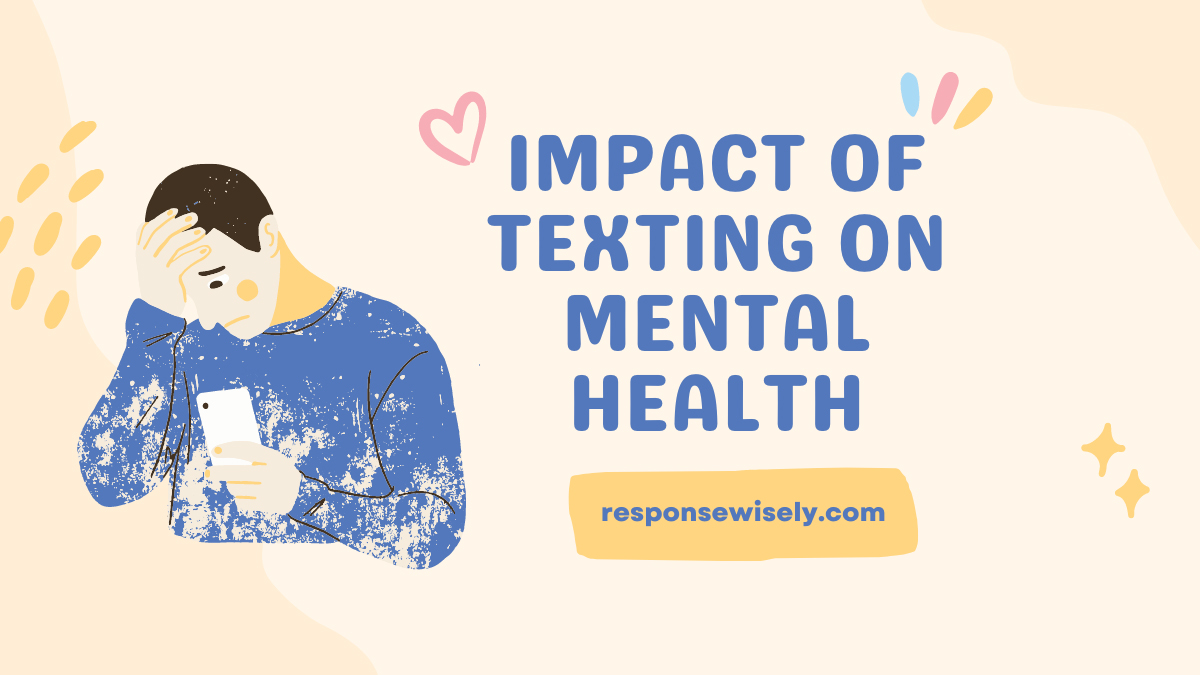In modern digital era, texting has become a fundamental part of how we communicate. But have you ever stopped to think about its impact on our mental health? As someone who’s delved into the world of psychology, I’ve uncovered some fascinating insights into the relationship between texting and well-being.
From late-night conversations to quick check-ins throughout the day, texting shapes the way we connect with others. But what does this mean for our mental state? Join me as we explore the effects of SMS on our overall well-being and investigate into the nuances of how our digital interactions can influence our mental health.
Through research and personal anecdotes, I’ll guide you through the intricate web of texting and mental health, shedding light on the ways in which our favorite messaging platform can both uplift and challenge our emotional equilibrium.
The Relationship Between Texting and Mental Health
Understanding the Role of Texting in Daily Communication
Texting plays a crucial role in daily communication, offering a convenient and efficient way to stay connected with others. It has transformed how we interact, making it easier to communicate and share information instantaneously.
The Effects of Excessive Texting on Mental Well-being
Excessive texting can have a negative impact on mental well-being. Studies have shown that spending excessive time texting can lead to feelings of anxiety and isolation. It’s essential to find a balance and prioritize face-to-face interactions to maintain a healthy state of mind.
| Studies | Anxiety | Isolation |
|---|---|---|
| On average, Americans exchange 94 text messages a day | Excessive texting can lead to increased anxiety levels | Heavy texting can contribute to feelings of isolation |
Tips for Maintaining Healthy Texting Habits
Setting Boundaries with Texting
Establish specific times for texting and stick to them. Avoid late-night conversations that can disturb your sleep. Limiting screen time can help reduce the negative impact of excessive texting on mental health.
Practicing Mindful Texting Techniques
Focus on the present moment when texting. Be aware of your emotions and how they are affected by your conversations. Take breaks and engage in other activities to prevent becoming too absorbed in texting.
| Key Point | Data/Stats |
|---|---|
| Limiting screen time | Can reduce digital eye strain and improve sleep quality |
| Being aware of emotions | Helps in maintaining healthy boundaries and preventing emotional exhaustion |
The Benefits of Using Texting for Mental Health Support
Access to Immediate Emotional Support
When feeling overwhelmed or anxious, reaching out for support is crucial. Texting provides the convenience of immediate connection with others, allowing for quick exchanges that can offer comfort and reassurance in times of need. This instant access to emotional support can help mitigate feelings of loneliness and isolation.
Utilizing Text-based Therapy Services
Text-based therapy services have revolutionized mental health care by offering individuals the opportunity to receive professional support conveniently through text messages. This form of therapy provides a safe space to express thoughts and feelings, fostering a sense of anonymity that may encourage open communication. Also, it offers flexibility in scheduling sessions, making it more accessible to those with busy lifestyles.
| Text-based Therapy Statistics |
|---|
| Over 90% of individuals find text-based therapy helpful. |
| Text therapy has shown a 53% reduction in symptoms of depression. |
| Text-based therapy is more affordable than traditional in-person therapy sessions. |
Key Takeaways
- Texting plays a vital role in daily communication, transforming how we connect with others and instantly share information.
- Excessive texting can lead to heightened anxiety levels and feelings of isolation, emphasizing the need for a balance with face-to-face interactions.
- Setting boundaries for texting, limiting screen time, and practicing mindful texting techniques can help maintain a healthy relationship with messaging platforms.
- Limiting screen time reduces digital eye strain and improves sleep quality, while being aware of emotions aids in setting healthy boundaries and preventing emotional exhaustion.
- Texting offers immediate emotional support and access to text-based therapy services, which have shown significant benefits in reducing symptoms of depression and offering convenient mental health care.
Conclusion
In this text, I’ve highlighted the significance of healthy texting habits for mental well-being. By setting boundaries and practicing mindfulness, individuals can enhance their texting experiences. Establishing specific texting times and limiting screen exposure are crucial steps in promoting better mental health. Mindful texting, which involves being present and taking breaks, can contribute to a more positive texting environment. Also, leveraging texting for mental health support can offer immediate emotional assistance and the convenience of text-based therapy services. These services provide anonymity, flexibility, and have been effective in alleviating symptoms of depression. Overall, maintaining a balanced approach to texting can positively impact one’s mental health and well-being.
Frequently Asked Questions
1. Why is setting boundaries important for healthy texting habits?
Setting boundaries is crucial for healthy texting habits to prevent constant interruptions and maintain a healthy balance between digital communication and real-world interactions.
2. How can mindful texting benefit mental health?
Mindful texting promotes emotional awareness, reduces stress levels, and encourages intentional and compassionate communication, leading to improved mental well-being.
3. What are the advantages of establishing specific texting times?
Setting specific texting times helps in boosting productivity, reducing distractions, and fostering deeper connections with others by giving undivided attention during those times.
4. How does limiting screen time contribute to better mental health?
Reducing screen time minimizes exposure to blue light, decreases feelings of anxiety and overwhelm, and promotes better sleep patterns, thus supporting overall mental health.
5. What are the benefits of text-based therapy services?
Text-based therapy services offer anonymity, flexible scheduling, immediate emotional support, and cost-effective mental health care, making them convenient and accessible alternatives to traditional therapy sessions.

